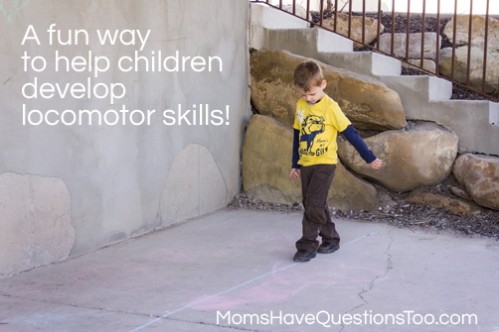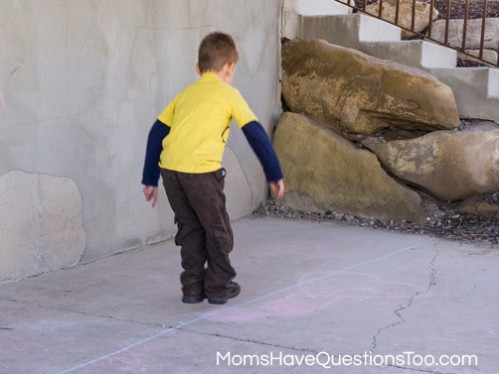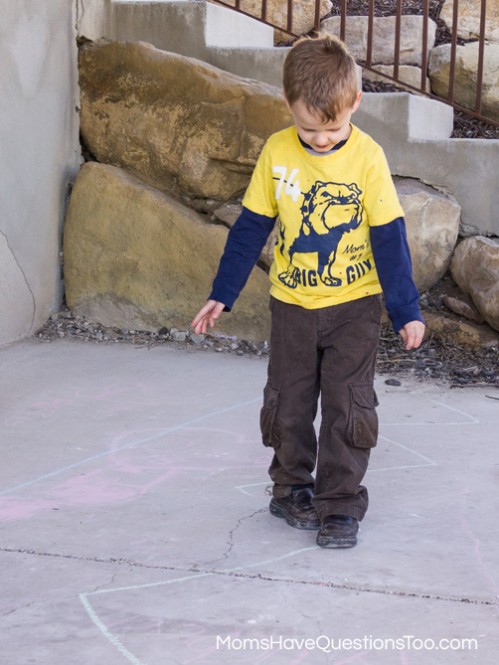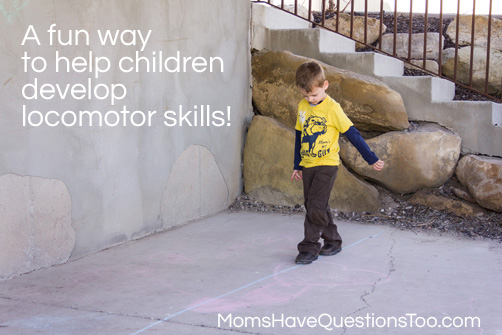First off, what are locomotor skills? Locomotor skills are the skills that we use to get from one place to another. They include walking, running, hopping, jumping, skipping, galloping, tip toeing, leaping, and sliding. It is very important for children to practice these for various reasons. I have done a lot of research on this subject lately and don’t consider myself an expert by any means, but I know enough to say this: locomotor skills and balance greatly affect learning.

It’s good for children to do these activities because of the exercise it provides, but that is NOT the only reason they are important. They help tremendously with the development of the brain and eyes. If you would like more information here is a list of books to check out:
- A Life in Balance: Discovery of Learning Breakthrough
- Smart Moves: Why Learning is not all in your Head
- Brain Gym: Teacher’s Edition
- Brain Gym: Simple Activities for Whole Brain Learning
Now, how can you practice these locomotor skills with preschoolers? That part, luckily, is quite easy and the preschoolers tend to love it. First, go outside. Nothing beats fresh air and your child and/or students will enjoy the activity much more if they get to do it outside. If the weather simply doesn’t allow outside play, then inside will do. Next, get some masking tape and tape down a long line for each student. Ideally the lines should be about 10-20 feet long. The students will want to use longer lines for the skills that have mastered (walking and running) and also for skills that use a lot of space (leaping and sliding). They will want shorter lines for the other skills. I strongly suggest starting with straight lines.
Now that each student has a straight line, tell them to stand at the end of it and to walk across the line. If they put one foot right in front of the other as if they were on a balance beam, that’s okay, but not required. Next, tell them to run across the line (they won’t treat the line like a balance beam any more ☺ ). Now, have them hop across the line. Tell them they can hop with only one foot or switch off between feet if they want. Now let them jump across the line. Be sure that they jump with both feet leaving the ground at the same time and both feet touching back down to the ground at the same time.

If your children or students have these skills mastered, then move onto the next stills one at a time. I would suggest introducing a new one every month or so. You can be the judge as to whether or not they are ready to learn a new skill. Here’s how to explain the trickier locomotor skills to your preschoolers:
- Skip: hop on one foot, and then quickly hop onto the other foot.
- Gallop: long step by the front foot, then a short step by the back foot. One foot stays in the front the whole time.
- Tip Toe: Stay on the front of both feet the entire time. Try to be extra quiet.
- Leap: Run then jump into the air and have one foot in front and one foot behind until you land.
- Slide: Run sideways and don’t cross your feet.
As students get more advanced you can add curvy lines and zigzag lines. You can also add ways to complete the locomotor skills (fast, slow, happily, crazily, like a lion, like a mouse, like a kangaroo, etc.)

Now that you know the locomotor skills, you can add them into your daily routine whenever it’s appropriate. When they are putting away their toys tell them to slide around the room instead of running. Have them hop around the kitchen table one time before dinner (or more if you need a break ;) ). If you are doing a treasure hunt or a relay race with them have them skip or tip toe instead of walking or running.
I cannot stress enough how important it is for children to master these skills. Like I said before, children usually enjoy these activities on their own. Take advantage of that and try to fit these skills in whenever you can. It’s never too early or too late to start.
